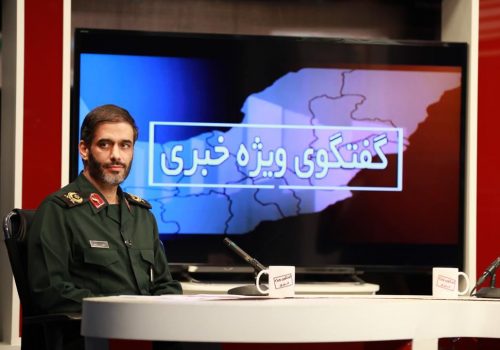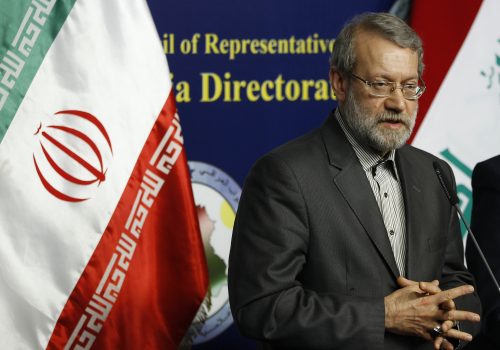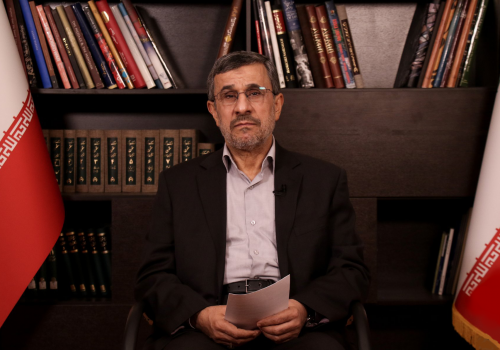Why would anyone—including Mohammad Javad Zarif—want to be Iran’s president?
In December 2020, a journalist for Afghanistan’s TOLO TV asked Iran’s Foreign Minister Mohammad Javad Zarif, “Will you run for president?” Zarif responded, “Absolutely, no.”
When the interviewer asked Zarif if he was tired, the minister said, “No, I know my capabilities and I don’t see myself as capable to do this job.”
Listening to his brief response, one cannot help wondering why anyone would want the thankless job of president of the Islamic Republic. Iran’s president has about as much power as the king of France did in the Middle Ages—that is, as much power as the church and nobles allowed him. In other words, not much.
The experiences of the seven men who have held the position since the 1979 Islamic revolution are not encouraging. The first—French-educated intellectual Abolhassan Bani Sadr—had to run for his life after he fell afoul of the leader of the revolution and aligned with the renegade Mujahedin-e Khalq (MEK). He escaped from Iran dressed as a woman and wound up in exile in Paris.
The second, Mohammad Ali Rajai, was assassinated after twenty-eight days in office. The third, Ali Khamenei—now Iran’s Supreme Leader—was maimed by an MEK assassination attempt. His successor, Ali Akbar Hashemi Rafsanjani, made something of the job, but he entered office already a very powerful figure, having served as the speaker of parliament and as Khamenei’s kingmaker after the death of the revolution’s leader, Ayatollah Ruhollah Khomeini, in 1989. Rafsanjani, who broke with Khamenei in the 1990s, lost a bid for a non-consecutive third term in 2005 and was denied permission to run again in 2013 by the Guardian Council, a cleric-dominated body controlled by Khamenei.
Iran’s fifth president, Mohammad Khatami, who won in 1997 partly due to Rafsanjani’s support, has become a silenced non-person for siding with candidate Mir Hossein Mousavi, who was denied victory in the disputed 2009 elections (Mousavi and his wife and another 2009 candidate, Mehdi Karoubi, have been under house arrest since 2011). The victor, then populist Mahmoud Ahmadinejad, has ambitions to run again but is likely to be rejected by the same conservative establishment that supported him in 2005 and 2009. Even Khamenei, who served as president from 1981-1989, allegedly complained at the time that he was nothing but a figurehead. If Zarif runs, it would likely only be if Khamenei encourages or orders him to step forward.
Current two-term President Hassan Rouhani has also had a rocky tenure. Although a well-connected member of Iran’s clerical ruling establishment, his main accomplishment—negotiating an easing of economic sanctions through an agreement to limit Iran’s nuclear program (the JCPOA)—blew up in his face after the unexpected election of Donald Trump in 2016. As a result, Rouhani has become the target of domestic enemies who accuse him of being duped by foreigners and failing to improve daily life for most Iranians. Rouhani has also not been able to check the excesses of Iran’s security services, which ignore the president and his ministers and operate their own state within a state.
Zarif, age sixty-one, has had a long career in academia and public service, but not in competitive electoral politics. He began his career while still a twenty-one-year-old student at San Francisco State University, serving as a member of Iran’s delegation to the United Nations and presenting Iran’s case during the Iran-Iraq war. His advocacy shaped his 1988 PhD thesis at the University of Denver, titled: “Self-defense in International Law and Policy.” Since then, he has held university positions in Iran and has been deputy foreign minister, Iranian ambassador to the United Nations (2002-2007), and foreign minister since the election of Hassan Rouhani as Iran’s seventh president in 2013.
In his diplomatic career, Zarif has dealt with some of Iran’s most sensitive problems, including negotiating a new government for Afghanistan after the September 11, 2001 terrorist attacks on the United States and, most notably, the 2015 Joint Comprehensive Plan of Action (JCPOA). His relations with his American counterpart, Secretary of State John Kerry, represented a dramatic shift in bilateral relations—the first such acknowledged high-level American-Iranian official contact since 1979.
The battles over the JCPOA and the US withdrawal from the agreement under the Trump administration have left scars. Domestic opponents have labelled Zarif a “traitor” and called for his trial and punishment. In February 2019, Zarif resigned his post, reportedly after being excluded from the Syrian President Bashar al-Assad’s visit to Tehran. President Rouhani—presumably with the Supreme Leader’s agreement—refused to accept the resignation.
These setbacks have tarnished Zarif’s appeal, although he remains the most popular member of the Rouhani administration, according to public opinion polls. The so-called pragmatist-reformist camp may turn to Zarif to encourage a cynical electorate to vote in Iran’s June presidential elections—if only to block another ideologue’s victory.
Prior to negotiating the JCPOA, Zarif carried out very demanding assignments, including, in 1992, having to translate for President Rafsanjani the message that President George H.W. Bush would not make good on his inaugural promise that “[Iranian] goodwill would beget [American] goodwill”—a reference to Iranian help in freeing US hostages held in Lebanon by Hezbollah. According to Giandomenico Picco, the United Nations envoy who carried the bad news, Zarif at first refused to translate the message for the president. He later told Picco, “You are mad to come here and say these things.”
After forty years experience in diplomacy and academia, Zarif is no stranger to duplicity, deception, and broken promises. With such preparation, he might seem highly qualified to be president of Iran. However, it remains uncertain whether he has the temperament, the talent, and the stomach for the bear pit of electoral politics.
When Zarif said, “absolutely no” to the interviewer’s question, he might have been making a straightforward rejection of a run. Or he could have been practicing ta’arof, an Iranian form of polite self-deprecation intended to elicit stronger appeals to be a candidate. According to the rules of ta’arof, only after such appeals does one, reluctantly, accede to what one wanted to do from the outset. If it is the latter, Zarif should be careful to avoid a trap in which he ends up agreeing with—and even multiplying—his polite self-deprecation. As the Persian warning goes, “ta’arof amad na-amad darad”—whatever your intention, people may take you seriously.
John Limbert is a retired professor of Middle Eastern Studies at the United States Naval Academy in Maryland. A Foreign Service Officer for thirty-four years, he served as deputy secretary of state for Iran under the Barack Obama administration. He was among the fifty-two Americans held hostage during the 444-day Iran hostage crisis. He is the author of Iran: At War with History, Negotiating with Iran: Wrestling the Ghosts of History, Shiraz in the Age of Hafez, and the (co-authored) spy novel Believers.
Image: Iranian Foreign Minister Mohammad Javad Zarif speaks in an exclusive interview with Kyodo News in Tehran on Feb. 14, 2021. (Kyodo)


